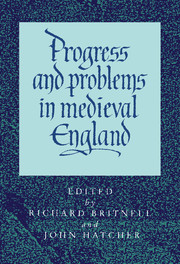Book contents
- Frontmatter
- Contents
- List of figures
- List of maps
- List of tables
- List of contributors
- Edward Miller: an appreciation
- List of abbreviations
- 1 Economic development in the early twelfth century
- 2 Lothian and beyond: the economy of the ‘English empire’ of David I
- 3 Boroughs, markets and trade in northern England, 1000–1216
- 4 Peasant deer poachers in the medieval forest
- 5 The growth of London in the medieval English economy
- 6 The bankruptcy of the Scali of Florence in England, 1326–1328
- 7 The English export trade in cloth in the fourteenth century
- 8 A medieval tax haven: Berwick upon Tweed and the English crown: 1333–1461
- 9 Taxation and communities in late medieval England
- 10 Peasants and the collapse of the manorial economy on some Ramsey Abbey estates
- 11 The famuli in the later Middle Ages
- 12 The great slump of the mid-fifteenth century
- 13 Lorenzo de' Medici's London branch
- 14 The trade of late medieval Chester, 1500–1550
- Bibliography of Edward Miller's published works
Edward Miller: an appreciation
Published online by Cambridge University Press: 05 June 2012
- Frontmatter
- Contents
- List of figures
- List of maps
- List of tables
- List of contributors
- Edward Miller: an appreciation
- List of abbreviations
- 1 Economic development in the early twelfth century
- 2 Lothian and beyond: the economy of the ‘English empire’ of David I
- 3 Boroughs, markets and trade in northern England, 1000–1216
- 4 Peasant deer poachers in the medieval forest
- 5 The growth of London in the medieval English economy
- 6 The bankruptcy of the Scali of Florence in England, 1326–1328
- 7 The English export trade in cloth in the fourteenth century
- 8 A medieval tax haven: Berwick upon Tweed and the English crown: 1333–1461
- 9 Taxation and communities in late medieval England
- 10 Peasants and the collapse of the manorial economy on some Ramsey Abbey estates
- 11 The famuli in the later Middle Ages
- 12 The great slump of the mid-fifteenth century
- 13 Lorenzo de' Medici's London branch
- 14 The trade of late medieval Chester, 1500–1550
- Bibliography of Edward Miller's published works
Summary
Edward miller came from a background in the north of England which inclined him to an interest in the land and agriculture. It was not surprising therefore that his first book, The Abbey and Bishopric of Ely (1951), was a substantial study of a great medieval landowner, which investigated the economic and social history of the English countryside. That was published after he had been for some years a Fellow of St John's College, Cambridge (that position interrupted by five years of war service), and Director of Studies in History, a role which allowed him to begin to encourage the careers of younger historians. The work on Ely also sprang, of course, partly from the strong Cambridge tradition of medieval economic and social history recently enlivened by M.M. Postan, to which Ted was to contribute so much.
Those who were his pupils in those days (the present writer first saw him crossing second court in uniform; would that have been in 1946?) remember him as the liveliest and most invigorating of teachers, who fired their enthusiasm for the study of medieval economy and society. They remember his wife Fanny's kindness to them, and those who have become professional historians will remember also their young son, John, now also a professor of history. Much of the research for Ely must have been done before 1939, but Ted's enthusiasm both for research and for stimulating the young has remained undiminished in the 1990s as his bibliography shows.
- Type
- Chapter
- Information
- Progress and Problems in Medieval EnglandEssays in Honour of Edward Miller, pp. xiii - xivPublisher: Cambridge University PressPrint publication year: 1996



